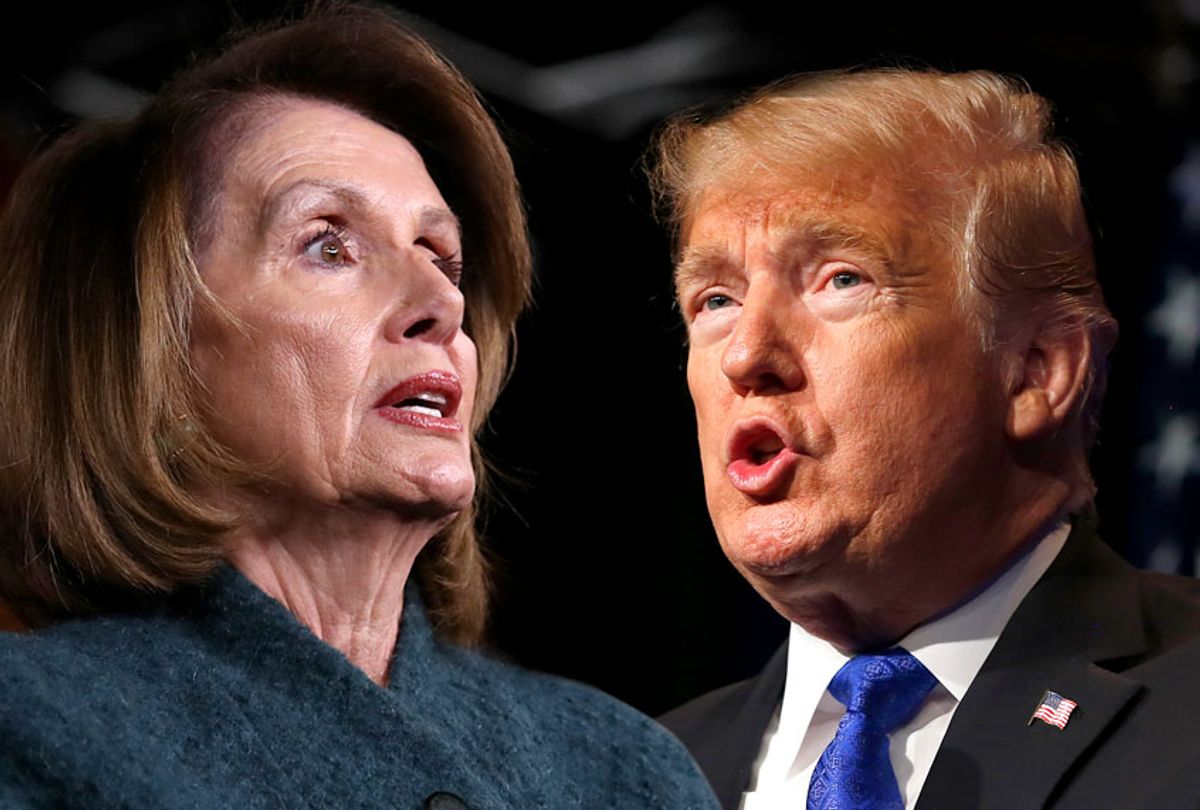“The Mueller Report” is so last week’s news. Health care has returned in force as the dominant political issue in Washington, reflecting what voters have been telling pollsters for the past year.
The Trump administration moved Monday night to get more in line with President Donald Trump’s voter base by endorsing a Texas federal judge’s December opinion that the entire Affordable Care Act should be struck down as unconstitutional.
After he arrived at the Capitol for lunch with Republican senators Tuesday, Trump endorsed the change, suggesting it will usher in Republican priorities instead. “The Republican Party will soon be known as the ‘party of health care!’” he told reporters.
Less than two hours later, House Democrats unveiled their proposals to not only protect the health law, but also expand it — including extending help paying premiums and other costs to families higher up the income scale than those now eligible and reinstating cuts made by the administration for outreach to help people sign up for coverage.
Speaker Nancy Pelosi said that, since taking control of the House in January, Democrats have been fighting to preserve the health law and “voted on Day One” to file a motion in the Texas court case to support the ACA.
The arguments are a return to one of the key battles during the 2018 midterm elections. Democrats hammered their Republican opponents on the GOP’s two-year efforts to repeal the ACA — and especially its popular protections for people with preexisting medical problems and Medicaid expansion — and credited those attacks for big gains the party scored in the House and legislatures around the country.
House Majority Leader Steny Hoyer said those Democrats were elected to “protect and expand” the health law. He warned Republicans not to undermine it, saying, “Americans don’t want to see the ACA protections undone.”
The new filing in the Texas case marks an about-face for the Justice Department. The Republican attorneys general and governors who brought the case argued that when Congress zeroed out the tax penalty for people who lacked health coverage as part of the 2017 tax bill, the entire Affordable Care Act was rendered unconstitutional. In December, U.S. District Judge Reed O’Connor agreed with them, although he put his ruling on hold while the case is on appeal.
At that time, the Justice Department did not endorse the GOP plaintiffs’ argument. It suggested instead that the elimination of the tax penalty should invalidate only those parts of the health law most closely associated with it — notably, the provisions requiring insurance companies to sell to people with preexisting conditions and not charge them more.
The health law is being defended by a group of Democratic attorneys general, led by California’s Xavier Becerra. They filed their brief Monday night, just before the Justice Department issued its position change.
“The Affordable Care Act is landmark legislation that has transformed the nation’s healthcare system,” said the brief. Striking it down “would strip existing healthcare coverage from millions of Americans” and “it would make a mockery of the dramatic votes in which the same Congress rejected earlier efforts to repeal or substantially revise the ACA.”
The Department of Health and Human Services declined to comment on the change of position, which was filed as part of the appeal process. Kerri Kupec, a spokeswoman for the Justice Department, said the department “has determined that the district court’s comprehensive opinion came to the correct conclusion and will support it on appeal.”
Trump has repeatedly called for the law to be repealed and replaced, but when Republicans controlled Congress they could not muster the necessary votes. Just last week, the president lashed out Sen. John McCain (R-Ariz.), who died in August, for failing to support that effort.
If the law is invalidated, it would not only directly affect the 11 million people who purchase insurance through the ACA marketplaces, but also millions of low-income people who gained coverage under the expansion of the federal-state Medicaid health program. The Urban Institute estimates full repeal would result in nearly 20 million more uninsured Americans.
The ACA also includes substantial changes to the Medicare program, extends protections to people with employer-provided insurance and includes such seemingly unrelated provisions as requiring calorie counts on restaurant menus and making it easier to make generic copies of expensive biologic drugs.
Health analysts warn that the law is so embedded into the fabric of the nation’s health system that eliminating it could have consequences well beyond the things it created.
“The act is now part of the plumbing of the health-care system,” wrote University of Michigan law professor Nicholas Bagley in a post for the Incidental Economist website. “Which means the Trump administration has now committed itself to a legal position that would inflict untold damage on the American public.”
Democrats, who already had their health event scheduled for Tuesday, were quick to pounce on what they see as a GOP weakness.
“In two short sentences, the Trump administration crystallized its position that the health care coverage enjoyed by nearly 20 million people, as well as the protections by tens of millions more with preexisting conditions, should be annihilated,” said Senate Minority Leader Chuck Schumer on the floor Tuesday morning.
Democratic presidential candidates also voiced their opposition.
“I’ll say it for the zillionth time: We will not let the Trump administration rip health care away from millions of Americans. Not now. Not ever,” tweeted Sen. Elizabeth Warren (D-Mass.).
Sen. Kamala Harris (D-Calif.) said in an interview on MSNBC that health care is “one of the biggest most critical issues facing American families. the existence of preexisting conditions and that being a barrier to people having access to health care. We decided as a nation” that it was wrong, she said, to deny someone with a preexisting condition access to health care, and that the Republicans’ latest move amounts to “playing politics with people’s public health.”



Shares